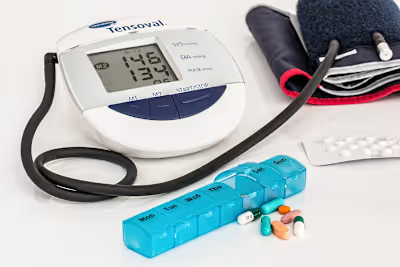Stress: Practical Tips to Manage Your Daily Stress

Is Stress a Trap or a Challenge?
Stress Can Be Very Serious.
Having a Stressful Moment? Here is Your Way Out:
A- Mild and Moderate Stress:
Take Deep Breaths:
Talk to Someone:
Meditate:
B- Severe Stress:
Healthy Habits for reducing daily stress:
Exercise regularly:
Eat a Healthy Diet:
Sleep Well:
Make Meditation Your Daily Habit:
Unwinding to Relax and Recharge:
Maintain a Routine:
Avoid Drugs and Alcohol:
It's Never Too Early:
Get Your Negative Thoughts Out:
Talk about Your Problems:
Go Easy on Yourself:
When was your last stressful moment!? Most likely, your stress is the reason why you are here.
For all of us, stress is a monster with a shadow looming everywhere from school and work to relationships. It has no mercy for children or sick people.
If you are looking for practical tips that can help reduce your stress significantly, then this article is your ticket to a more comfortable life.
Is Stress a Trap or a Challenge?
Stress is a physiological and psychological response to a change in a situation that the body and mind find to be overwhelming.
Meanwhile, The fact that all the stress can't be avoided is indefensible. The stress that comes with the grief after pandemics or shootings diverges from the stress following someone's divorce.
As said by Jeff Bezos, "Stress usually comes from not taking action over something you can have some control over."
Stress Can Be Very Serious.
Stress may affect you, both emotionally and physically:
Loss of self-esteem and confidence
Poor judgment and mood changes
Hypertension and atherosclerosis
Because stress can cause many effects ranging from mild (i.e. decreased productivity at work) to serious consequences such as panic attacks and suicide, it pays off to know how you can handle stress. Here are some effective tips. Once you practice them, you will have a strategy in place to manage your stress easily.
Having a Stressful Moment? Here is Your Way Out:
Before you try to control these stressful moments, take a few seconds to observe whatever negative thoughts and feelings you have. Is it just worry or anxiety? Or maybe you have angry outbursts, chest pain, shortness of breath, or suicidal thoughts?
A- Mild and Moderate Stress:
With these simple methods, you can effectively relieve your anxiety and stress.
Take Deep Breaths:

Just a few deep breaths can be enough to handle stress. Taking deep breaths has been linked with reducing the activity of the sympathetic nervous system, which is the main body system mediating your stress.
Before starting, make sure you are in a place with little to no distractions.
Breathe through your nose. Apart from warming and humidifying the air that reaches the lung, nasal breathing enhances oxygen delivery via the nitric oxide release.
Breathe using your diaphragm. While your stress is mediated by your sympathetic nervous system, you can initiate relaxation with your parasympathetic system. But how? Simply try to use your diaphragm while breathing.
The more comfortably you sit, the more productive the breaths will be.
Detach yourself from the current world, maybe by closing your eyes, or by meditation.
Moderate your breaths. Too fast or too slow breathing can cause hyperventilation or hypoventilation, respectively. Consequently, this can disturb levels of oxygen and carbon dioxide in your blood.
Talk to Someone:

Talking to someone can make a big difference to alleviate whatever stress you have. For this to work best, just keep in mind two facts:
You need to choose people you trust such as your partner, your best friend, or your parents.
Just as importantly, you should listen actively, be open to new ideas, and avoid judging or criticizing the other person.
The benefits of talking to someone about your stressful moments can be striking. Talking can help you:
Release your negative emotions and feel better.
Gain perspective and clarity on your problems.
Receive support and validation from someone who cares.
If you don’t open a lid periodically, the steam can build up and cause you to feel even more stressed.”
Meditate:

The term “meditation” refers to a variety of practices that focus on mind and body integration and are used to calm the mind and enhance overall well-being. Meditation can help greatly during acute stressful moments. Here is how meditation can give you control over your current moment:
According to Mayo Clinic experts, meditation is a great way to lower the resting heart rate and blood pressure accompanying stress.
Moreover, the deeper you meditate, the more mindfulness you get, where you have more control over your current moment.
Focusing your attention on the present moment can help you let go of worries and negative emotions that may trigger or worsen stress.
Whatever stressful moment you have now, you can try simple rather than more complicated meditation methods.
Examples of Meditation:
Breathing meditation: This involves focusing on your breath and noticing how it flows in and out of your body. You can count your breaths, or simply observe the sensations of breathing. This can help you calm your mind and relax your body in a few minutes.
Walking meditation: This involves paying attention to your movements and surroundings as you walk. You can notice how your feet touch the ground, how your muscles feel, and what you see, hear, smell, or touch along the way. You can also recite an affirmation as you walk. This can help you connect with your body and nature and release tension.
Engage in prayer. Prayer is the best-known and most widely practiced example of meditation. Spoken and written prayers are found in most faith traditions. You can pray using your own words or read prayers written by others
B- Severe Stress:
Stress can be very serious in two ways:
The first is when the stressful moment is so overwhelming that you get chest pain, a panic attack, or suicidal thoughts. This is when you should seek immediate medical attention. Severe stress can be managed with proper care and support.
The Second is when stress lasts for a long time and affects your physical and mental health.
Chronic stress can increase your risk of developing health problems, such as heart disease, high blood pressure, diabetes, obesity, and a weakened immune system. Therefore, it is important to find healthy ways to cope with daily stress and seek professional help if you feel depressed or tremendously overwhelmed.
While the previous tips serve mainly as emergency tactics that you can implement during stressful moments, some healthy habits can spare you a lot of stressful moments.
Healthy Habits for reducing daily stress:
Exercise regularly:

Exercise can prevent and reduce stress by boosting your physical and mental health, and by providing you with a positive outlet for your emotions. It's no secret that people who work out regularly lead mindful lives. Here are some remarkable benefits of exercise:
Exercise has been proven to increase natural body endorphins which enhance mood. In addition, it reduces cortisol, a hormone associated with stress.
Furthermore, as you exercise, you become more skilled at controlling your body, which gives you more confidence to cope with stress without blowing up.
It reduces the negative effects of stress. Exercise can help lower your blood pressure, heart rate, and stress hormones, and improve your immune system and digestion.
Eat a Healthy Diet:

Your healthy diet can prevent and reduce stress by providing your body with the nutrients it needs to cope with the demands of life and support your immune system.
The good news is that it doesn't have to be restrictive or complicated. Here are some tips:
Choosing whole grains instead of refined ones can make the difference between some people who can handle stress and those who can't.
Adding more fruits and vegetables into your diet is important to replenish vitamins A, B complex, and other vitamins which can be depleted in stressed people.
When you maintain a healthy diet, you keep a healthy weight, lower your blood pressure and cholesterol levels, and prevent chronic diseases such as diabetes, heart disease, and cancer. These conditions can increase your stress levels and affect your quality of life.
Sleep Well:

Good sleep hygiene practices prevent stress by helping you get enough rest and recharge your body and mind. Lack of sleep or poor quality sleep has been associated with weakened immunity, leading to infectious illnesses which cause stress. Here are some benefits of sleeping well:
When you sleep well, you boost immunity.
In addition, getting enough sleep helps with deep relaxation and hence reduces stress.
Sleep helps reset the baseline of anxiety and stress hormones by preventing the activation of the fight or flight response.
To enjoy these benefits you have to get enough sleep quality and duration which can be achieved by following good sleep hygiene practices. Try to practice these tips:
Being consistent with your sleep schedule. Go to bed and wake up at the same time every day, including weekends.
Avoiding large meals, caffeine, alcohol, and nicotine before bedtime. These can interfere with your digestion, sleep quality, and stress levels.
Getting some exercise during the day. Physical activity can help you fall asleep faster and sleep better. However, avoid exercising too close to bedtime, as it can keep you awake.
Taking time to unwind before bed. Do some relaxing activities, such as reading, meditating, or taking a bath. Avoid checking your email, social media, or news stories which can cause stress or anxiety.
Limiting naps during the day. Napping too much or too late can disrupt your sleep cycle and make it harder to fall asleep at night.
Make Meditation Your Daily Habit:

While you can use simple meditation methods during acute stress, working on regular meditation helps reduce the baseline of your daily stress to a minimum. Meditation can help you calm your mind and body, and reduce the negative effects of stress on your health and well-being. According to Mayo Clinic, meditation is a type of mind-body complementary medicine that can produce a deep state of relaxation and a tranquil mind. Meditation can be a powerful tool for reducing stress and anxiety in two ways:
Relaxation response: Meditation triggers the relaxation response, which is the opposite of the stress response. This helps to reduce the levels of stress hormones in the body and promote relaxation.
Mindfulness: Meditation can help you become more mindful, which means being fully present at the moment and observing your thoughts and feelings without judgment. This can help you to let go of negative thoughts and feelings that contribute to stress.
However, for meditation to work best, you need to stick to the following steps:
Set a regular time and place for your meditation practice. Ideally, you should meditate every day, preferably in the morning or evening, for at least 10 minutes. Find a quiet and comfortable spot where you won't be disturbed or distracted. You can use a cushion, a chair, or a mat to sit on.
Prepare yourself for the meditation with a few minutes of relaxation. This may be as simple as stretching yourself or even taking some deep breaths.
Focus on an object of attention. depending on the type of meditation you choose, you can focus on an image, a word, or a sensation without judging or analyzing. Your mind will try wandering, but you know what to do. Gently bring it back!
Be kind and compassionate to yourself. Meditation is not about achieving perfection or suppressing your thoughts and emotions. It's about observing them with curiosity and acceptance.
End your meditation with gratitude and positive affirmations. When you finish your meditation, take a moment to express gratitude for yourself and others. You can also say some positive affirmations to yourself, such as "I am calm and peaceful", "I can handle any challenge", or "I am worthy of love and happiness". This can help you reinforce the benefits of your meditation and boost your self-esteem.
Meditation can help you reduce stress and anxiety by enhancing your emotional and physical well-being. However, it may take some time and practice to see the results. Be patient and consistent with your meditation practice and enjoy the journey.
Unwinding to Relax and Recharge:

Reading, walking or drawing can help you cope with stress. This is when we take a break from our daily responsibilities and focus on something that we enjoy. Taking time to unwind can help you to cope with stress healthily by:
Getting a sense of accomplishment in reading or even doing puzzles, which can reduce stress and anxiety.
Engaging with others. Some hobbies such as walking or playing cards which are done in pairs or groups are effective means of connecting with others. The more you engage with the community around you, the less you feel isolated and stressed.
Taking time to unwind to prevent stress means giving yourself permission to relax and recharge. So always be kind and compassionate to yourself and not feel guilty or lazy for taking care of your needs.
A daily routine gives you a sense of order and timing. This regularity can help to lower nervousness and tension.
Maintain a Routine:

Maintaining a routine can help you cope better with stress and improve your quality of life. The longer you keep a daily routine, the happier and less stressful life you will have. This is true in many ways:
Predictability: A daily routine gives you a sense of order and timing. This regularity can help to lower stress and tension.
Sense of Control: When you follow a routine, you feel like you are in charge of your day. This can help you to overcome feelings of being powerless and boost feelings of being capable.
Taking better care of your health: Having a routine can help you plan your meals, exercise, medication, and other healthy habits. This can improve your physical and mental well-being and prevent chronic diseases.
Maintaining a routine to prevent stress means having a consistent structure and pattern to your day. Be sure that it suits your needs and preferences. It also means being flexible and adaptable when unexpected changes or challenges arise.
Avoid Drugs and Alcohol:

At first glance, it seems that they help reduce stress but time always proves this wrong. According to Beyond Blue, drugs and alcohol can change the balance of chemicals in your brain that help you think, feel, create and make decisions. They can also increase your symptoms of depression and anxiety, and make it harder for you to cope with stress.
As you indulge in drinking, you are just letting the little issues that cause you to be stressed get bigger and bigger.
Taking drugs and drinking alcohol have been linked to addiction, liver damage, and heart diseases. Being sicker means more stress.
In most cases, getting drugs causes a financial burden, which means being more anxious and stressed.
Moreover, drinking alcohol has been a known killer of relationships so you will end up isolated from family and friends.
Instead, you can try adaptogens which are natural substances that can help your body adapt to stress and balance your hormones. Some of the adaptogens that can have a relaxing effect are reishi mushroom, lemon balm, and passionflower.
It's Never Too Early:

As mentioned earlier, stress usually comes from not taking action over something you can have some control over. It's these little issues you keep ignoring until they get overwhelmingly stressful.
Dealing with little problems early can be a powerful way to reduce stress. But how?
Is it by preventing escalation? Yes.
But it also enhances your productivity and helps maintain positive relationships.
By dealing with little issues early, you can prevent them from becoming bigger problems that affect your health and well-being.
Being proactive and taking charge of your situation early enough can spare you a lot of stress and worry. It also means being aware of your stress levels and recognizing the signs and symptoms of stress.
Get Your Negative Thoughts Out:

Stress always comes with negative thoughts and feelings in a vicious cycle. Once you get rid of one, the other goes away. Other than stress, negative thoughts can fill you with fear, sadness, rage, or despair. Here's how can you get the negative thoughts out of your head and replace them with highly positive ones:
The two-column method: This is a way of writing your negative thoughts on one side and writing opposite or different thoughts on the other side. This can help you fight your negative thoughts and look at them differently.
Finding new facts: This is a way of searching for things or events that go against your negative thoughts. For example, if you think that you are a failure, you can search for things or events that show your success and achievement. This can help you make your negative thoughts more equal to your positive ones.
Distracting yourself: This is a way of doing something else that takes your mind off your negative thoughts. For example, you can see a film, read a book, play a game, or speak to a friend. This can help you stop the loop of negativity and give yourself some rest.
Being happy doesn’t mean you never feel bad. Sometimes, you might feel sad, angry, tired, and upset. That’s okay. You don’t have to hide your negative feelings.
Think of your negative thoughts and feelings as signals that your body is sending you. If you ignore these signals, they will keep coming back until you pay attention to them.
Instead, listen to your negative feelings so you can solve the problems that are making you feel that way. This will help you be happier in the long run.
Talk about Your Problems:

Depending on how serious the issue you are going through is, you may need to talk to a health professional, a friend, or a parent. Talking about your issues can reduce your anxiety and stress in many ways. Some of the ways are:
Ventilating your emotions: Talking about your problems can help you release pent-up feelings. This can make you feel lighter and more relaxed.
Gaining new perspectives: Talking to someone else about your problems can help you see them from a different angle and gain new insights or ideas. When you talk with someone about your issues, you can gain new insights and find new solutions.
Getting support and empathy: Talking to someone who cares about you and understands what you are going through can make you feel less alone and more valued. You may also get practical or emotional help from them, such as advice, encouragement, or comfort.
Do you have someone you can talk to about your issues?
Go Easy on Yourself:

No one is perfect. Let that sink in. All you need to do is, focus on what you can control, things that you can change. Plus, it helps to feel gratitude for the good things you still have. But why is this so important for you to manage stress?
Going easy on yourself while dealing with stress is important for your mental and physical health. Some of the reasons are:
Reducing anxiety and depression: Being kind to yourself when you are suffering can help you lower your levels of anxiety and depression. You can acknowledge your pain and comfort yourself instead of judging yourself harshly.
Enhancing well-being and happiness: Being gentle with yourself when you are facing challenges can help you improve your well-being and happiness. You can appreciate your strengths and achievements instead of focusing on your flaws and failures. By going easy on yourself, you can build your resilience and cope better with stress.
Stress can be overwhelming, but it can also be a catalyst for growth and change. As the famous author Mark Twain once said, “The secret of getting ahead is getting started.” So don’t let stress stop you from pursuing your dreams and living your best life. Instead, use it as a motivation to start something new, learn something new, or do something new. You never know where it might lead you.
In the end, stress can be avoided in most situations once you identify the triggers behind it. Even if it still attacks, you now know, how you can cope with it. Don't let stress wreak havoc on your life.
Like this project
Posted Apr 28, 2023
PRACTICAL STEPS TO COPE WITH DAILY STRESS. Written and medically reviewed by Mahmoud Nassar, MD.
Likes
0
Views
20





